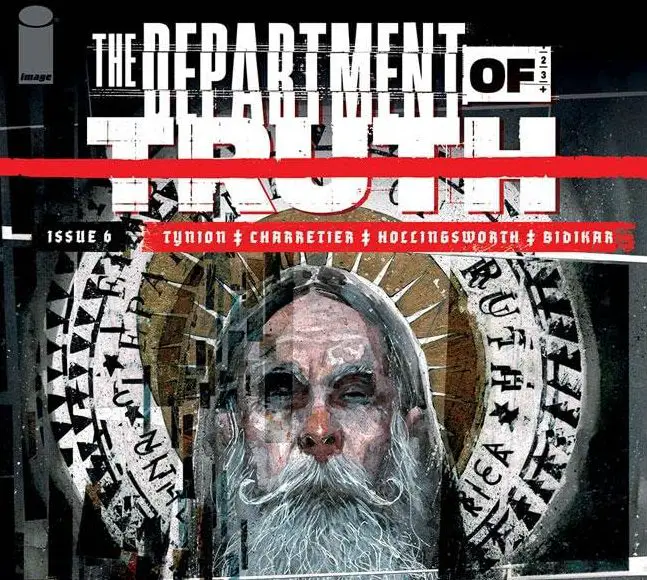Issue #6 of James Tynion IV and Martin Simmonds’ Department of Truth takes on the muddy waters of our collected human history and our records of time – or, at least, the ones we think we know. In line with the old adage that history is told by the victors, we’re introduced to a very strange concept called the “phantom time” hypothesis, in which the records of history have been changed to modify our religious and political perceptions and alter our reality.

Image Comics
In the issue, a book from the year 1,000 AD tells the tale of this altered history through the eyes of an old “witch” who calls herself Julia Augusta, and claims to be the “progeny of the last Roman Emperor, Romulus Augustus.” That would seemingly make her hundreds of years old, but the Roman Catholic Church changed the calendars in order to seize more power. Medieval emperor Charlemagne never existed; he was a hoax created to facilitate the fictional timeline we now adhere to. Three hundred years have been created out of thin air.
Proposed by publisher Heribert Illig in 1991, the phantom time hypothesis holds that the Catholic Church, led by Pope Sylvester II, rewrote the calendar to put themselves at 1,000 AD, rather than around 700 AD. As a result, the years 614 – 911 are simply made up. The origins of the idea, though, stem all the way back to 1685.
According to author and journalist Jason Colavito, the French scholar Jean Hardouin “was convinced that all of the ancient records of Greece and Rome were forgeries perpetrated by Benedictine monks, and that all of the Greco-Roman artifacts were similarly faked. By the time of his death in 1729, he had not provided a reason why the Benedictines would fake so much history, nor a shred of evidence to back up his claims.”
By 2004, the Russian mathematician Anatoly Fomenko took the helm of the phantom time hypothesis. Fomeko’s concept was called the “New Chronology,” a revisionist view of history imbued with propagandist panderings. By altering history, Fomenko altered the political strength of his Motherland. He argued that Great Britain came from the Byzantine Empire, which would allow Russia to take the credit and reap the rewards for settlements once attributed to the British.
Fomeko said that certain historical records had their dates purposely altered in order for Britain to “steal” the glory from Russia. He claimed that only one original historical document exists (the “True History”), and a sort of “whisper-down-the-alley” game during translation and interpretation turned one into four. By this stretch of the imagination, he proposes that those who recorded medieval history ended up creating a record four times longer than what had actually occurred.
Fomeko’s solution was to shrink this timeline to exclude the three subsequent and imperfect records of history, thereby shaving off a few centuries. He tried to use his expertise in math to prove this, along with the astronomical accounts in Ptolemy’s Almagest. With this flawed methodology, Fomeko posits that the Roman Empire actually started in the 9th Century.

Image Comics
“His entire theory depends on his idea that history is merely the chronicle of the reigns of monarchs, and that the mathematical relationships between their reigns is as sound as the [mathematical] relationship of two sides of an algebraic equation,” Colavito writes. “This is nonsense of the worst kind, made worse by the fact that Fomenko had to actively rewrite Byzantine history to get his correlation to match the English history he so badly wants to appropriate.”
Questioning history isn’t necessarily an illogical concept, but it is ultimately the job of historians. Problems arise when this questioning leads to an idea that fits a political need, like in the phantom time hypothesis or even Holocaust denial. Historical truth is subjected to the same general scrutiny as scientific topics, and just because a revisionist uses the mantra of every high school math teacher to “show their work,” that doesn’t mean they’ve arrived at the correct conclusion.
AIPT Science is co-presented by AIPT and the New York City Skeptics.
Join the AIPT Patreon
Want to take our relationship to the next level? Become a patron today to gain access to exclusive perks, such as:
- ❌ Remove all ads on the website
- 💬 Join our Discord community, where we chat about the latest news and releases from everything we cover on AIPT
- 📗 Access to our monthly book club
- 📦 Get a physical trade paperback shipped to you every month
- 💥 And more!














You must be logged in to post a comment.